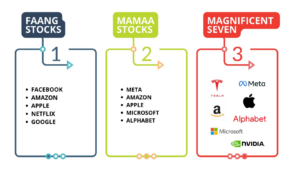Did you see the info in Dave’s current submit in regards to the overconcentration of Tech shares within the S&P 500 and suppose it was shocking? In that case, I’ve some information for you…
The Nasdaq 100, a subset of the Nasdaq Composite Index that’s ceaselessly referenced in monetary media, is present process a particular rebalance on July twenty fourth. Since its launch in 1985, this has solely occurred two different occasions in its virtually 40-year historical past. What’s triggering this particular rebalance? The Nasdaq 100 index, usually used to characterize U.S. Development shares, has change into too concentrated and must diversify its allocation.
2023: Yr of the “Magnificent Seven”
The Nasdaq 100 is made up of the 100 largest non-financial firms listed on the Nasdaq change. As of seven/11/2023, seven firms make up greater than 54% of its allocation: Microsoft (ticker: MSFT), Apple (ticker: AAPL), Amazon (ticker: AMZN), Google dad or mum Alphabet (tickers: GOOG & GOOGL), Tesla (ticker: TSLA), Nvidia (ticker: NVDA) and Meta (ticker: META) previously often called Fb.
These shares are being anointed the “Magnificent Seven.” Beforehand, there have been the “FAANG” shares, then it was adjusted and renamed to the “MAMAA” shares and now—the “Magnificent Seven.”

Hokey labeling conventions apart, I feel many individuals would agree these have been and stay a few of the most influential firms throughout the globe. They’re behemoths that contact so many features of the financial world and our day by day lives. They’ve additionally had an outsized affect on the subject of index stage funding returns, particularly in 2023. Take a look at the distinction between these two ETFs within the chart under: one is the usual, cap-weighted Nasdaq 100 represented by $QQQ and the opposite is the equal-weighted Nasdaq 100 represented by $QQQE.
As of July eleventh, $QQQ has outperformed $QQQE by +16% to date this yr. All due to being closely allotted to the “Magnificent Seven” shares.

The Nasdaq 100 is basically a cap-weighted index that means the biggest market-cap shares get the very best allocations and have essentially the most influence on the index’s efficiency. The Equal Weighted Nasdaq 100 which, because the title implies, offers each place an equal allocation. Equal Weight indices often supply a greater view into how the “common” inventory within the index is performing.
The mega-cap Tech shares have posted unbelievably excessive returns and are drastically outperforming the common inventory inside the index. Because of its cap-weighting methodology, the allocations to the “Magnificent Seven” shares have ballooned to regarding ranges inside the index. In actual fact, their allocations contained in the index have grown a lot that the index suppliers are conducting a particular one-time rebalance on the heels of its current commonplace quarterly rebalance.
Too A lot of a Good Factor Can Be a Unhealthy Factor
Whereas outperformance isn’t a problem, being overconcentrated in a handful of holdings is.
Clearly the folks operating the index respect this danger and so does the SEC. The SEC has particular diversification guidelines that registered funding firms, which incorporates publicly traded index ETFs, should observe. Since one of many targets of shopping for a passive index ETF is to realize diversified publicity to broad markets by way of proudly owning a single funding product, the SEC has limits on the combination weights of the biggest inventory holdings for these merchandise.
To assist forestall these index-tracking merchandise from violating SEC laws, the suppliers of the Nasdaq 100 have their very own diversification guidelines. The index methodology units out limits that ought to come into play earlier than the SEC limits. Per its methodology, the mixed whole of positions which have at the least a 4.50% particular person weight contained in the index, can’t be higher than 48% of the whole index’s allocation. At about 54%, the index has hit this restrict and now the index suppliers are taking motion.
Let that sink in. A “passive” index is making an “energetic” resolution to cut back danger and its publicity to the best-performing positions by rising its diversification. That’s not one thing you see each day.
Be Grateful for Diversification…and Eat Your Free Lunch
Most traders studying this proper now most likely have some publicity to those mega-cap Tech names, both by proudly owning an ETF like $QQQ or by holding the person shares of the “Magnificent Seven.”
First off, should you personal these, congratulations! You almost certainly have some robust portfolio positive factors due to current market motion. These positive factors are probably even larger should you’ve held these positions for years. Nevertheless, if that’s the case it’s most likely time to overview your allocation.
When you personal the $QQQ, your ETF will rebalance robotically because the underlying index itself is making modifications. However should you personal the person shares, there’s an opportunity you might be severely overallocated to the shares which have been on a rocket ship to larger ranges. Whereas these holdings might have helped your current efficiency, possibly now’s the time to diversify.
I’m not saying it’s a must to and even ought to make modifications to your allocation—that call is dependent upon the particular circumstances of your monetary plan. However even the Nasdaq 100, a passive index, is taking an energetic strategy to danger administration, so why wouldn’t you at the least contemplate taking some related actions to spice up your diversification and cut back your general danger profile?
Diversification is essential to managing danger and provides safety to your portfolio. True diversification means there ought to be at the least one funding or technique in your portfolio that’s underperforming always. Which may appear counterintuitive, however give it some thought: if the whole lot you personal goes up quickly, what’s stopping it from all happening simply as rapidly? Quick reply: most likely nothing.
If you’re DIY-ing your portfolio, or your present advisor is overexposing you to focus danger (I.e., by being closely chubby to Tech shares), possibly it’s time for a second opinion. A accountable Wealth Supervisor understands the significance of diversification. They shouldn’t be so targeted on the chances of outsized portfolio returns that they ignore the dangers to your long-term monetary plan that include an overconcentrated allocation.
Nobel Prize winner Harry Markowitz reportedly mentioned that “diversification is the one free lunch” in investing. I’ve hardly ever turned down a free lunch in my life, particularly on the subject of investing. And I hope you received’t both!
For extra of my ideas about investing, observe me on LinkedIn.

